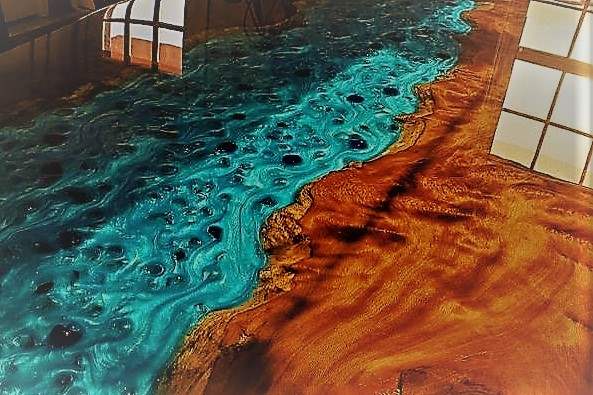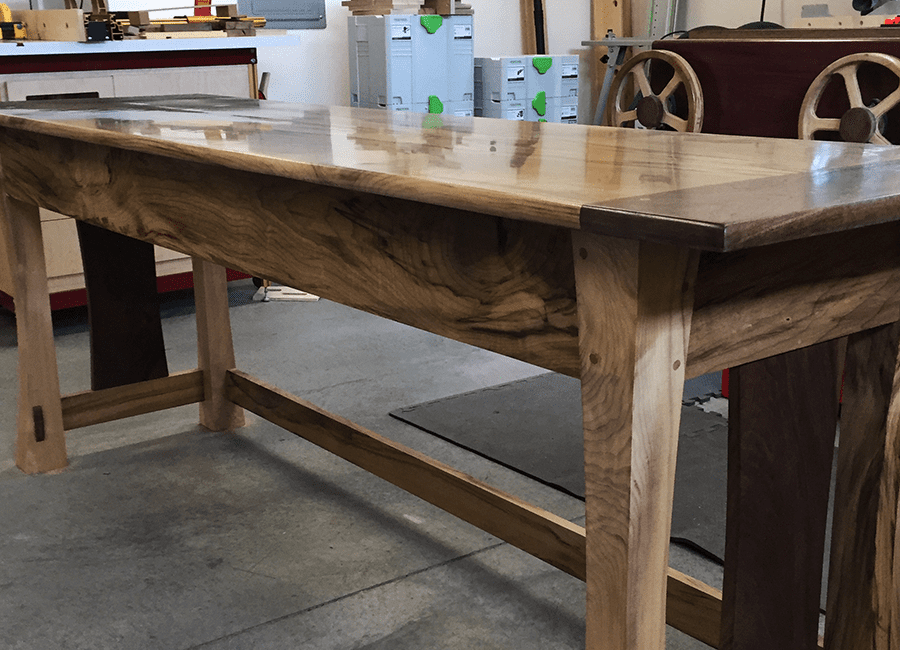When it comes to choosing between water-based polyurethane and oil-based polyurethane for your project, it’s not unusual to encounter lots of questions.
The extensive selection of brands and a diverse range of application-specific formulations can make it challenging to determine the ideal material that will provide both the desired aesthetic and long-lasting durability.
This dilemma often becomes even more confusing when considering the application’s safety and the desired wood finish outcome.

What is Polyurethane?
Let’s begin by exploring some straightforward yet perplexing methods of branding and defining polyurethane.
In your quest for oil-based products, you will come across various terms such as urethane, oil-modified urethane, 1k polyurethane, 2k polyurethane, and moisture-cured urethane. This already sets us on a path that can easily confuse anyone who lacks expertise in coatings.
To make things even more complex, when delving into the realm of water-based polyurethane, you will encounter terms like self-crosslinking polyurethane, waterborne polyurethane, hybrid urethane, 2-Part polyurethane, and polyacrylic. All of the aforementioned terms serve to identify different (and occasionally overlapping) types of urethane-based coatings.
How To Choose? Let’s start by asking another question: what are your wood finishing objectives and circumstances?
Determining what kind of urethane to use and whether to use one at all, involves considering a comprehensive checklist of product performance factors.
When aiming for maximum chemical resistance, film hardness, and overall physical durability—qualities crucial for a safe and reliable wood finish—opting for a urethane is advisable.
However, it is equally important to select a mission-specific product tailored to your specific requirements. For instance, you need to consider whether the coating will be applied to wood furniture, cabinetry, interior architectural trim, or to wood and concrete floors, .
Furthermore, when evaluating exterior applications, additional considerations come into play. These include assessing the need for UV resistance, good flexibility to withstand environmental changes, high moisture resistance, and the ability to withstand exposure to salt spray corrosion and other external elements.
With these factors in mind, let’s now compare water-based polyurethane and oil-based polyurethane in terms of their suitability for different scenarios.
While there may be exceptions to these comparisons (some of which are mentioned below), the following overview and questions will generally help simplify your decision-making process, ensuring a safe and effective wood finish in approximately 90% of cases.

8 Questions to Help You Decide Which Polyurethane Product is Right For You.
1. What Sort of Final Finish Look and Feel Do You Need?
A well-engineered water-based polyurethane can match the clarity of oil-based polyurethane. Here is how the finishes compare on other measures…
| Water Based Polyurethane | Oil Based Polyurethane |
| Water-based polyurethanes are entirely transparent and, when properly formulated, remain clear/non-yellowing – although certain types are formulated to turn a soft straw/amber color over time. The non-yellowing characteristic is particularly advantageous if you desire to maintain the natural color of the wood consistently. | On the other hand, some individuals prefer the warm, “amber” tone that oil-modified polyurethane imparts to wood. However, it’s important to note that this yellowing effect will persist and intensify as time goes on. |
| Water-based polyurethane has a harder feel, yet remain flexible with extra applications. | Due to its thicker viscosity, a single coat of oil-based polyurethane typically feels softer compared to water-based polyurethane – but may crack/check over time. |
| Water-based polyurethane might be more susceptible to scratching. | Some people find that oil-based polyurethane is more prone to dents and peeling. |
It’s crucial to bear in mind that there are variations within each type of urethane, so carefully reviewing the product specification sheet is advisable.
2. How Important is Durability to Your Project?
For some time, oil-based polyurethane held an advantage in this aspect. However, water-based polyurethane, particularly the self-crosslinking type, has made significant progress and is now on par with solvent-based products in terms of scuff, mar, UV, water, and corrosion resistance.
When aiming to achieve an exceptionally durable wood finish, oil-based polyurethane may seem appealing.
However, it’s crucial to consider the hazardous additives and flammable solvents involved, as utilizing them poses significant safety risks and health concerns.
3. How Important is Safety to You?
Oil-based polyurethane utilizes highly flammable and toxic solvents to facilitate the leveling and formation of the urethane resin into a cured film. Additionally, the clean-up process involves handling high-odor hydrocarbon solvents, which are known to cause both short- and long-term health issues as extensively documented.
On the other hand, a well-engineered water-based polyurethane typically contains minimal to no ingredients classified as “hazardous chemicals” according to OSHA’s definition. Moreover, a high-quality water-based polyurethane significantly reduces volatile organic compounds (VOCs), often achieving up to a 50% lower VOC content compared to oil-based alternatives.
4. What’s Your Timeframe?
All things being equal (temperature, humidity, etc.) oil based polyurethane will take about two to three times longer to dry between coats compared to faster-drying water based polyurethane.

5. How Many Coats Will You Need to Use?
Water-based polyurethane has a tendency to interact more with the wood grain, which often necessitates the application of multiple coats to achieve a smooth finish. As a general guideline, it is recommended to apply at least two coats of water-based polyurethane for every coat of oil-based polyurethane.
With a water based poly, you have unlimited coats available. Want to put on six layers? Go for it.
Oil based polyurethane, on the other hand, is prone to “sheeting,” checking or chipping after the first couple layers.
6. What Are You Finishing?
Water-based polyurethane exhibits remarkable versatility, forming strong bonds with a wide range of materials such as wood, non-ferrous metal, fiberglass, stone, cement, and carbon fiber.
Similarly, oil-based polyurethane also adheres well to various surfaces, except for its own layers. Consequently, sanding between coats becomes necessary to establish a mechanical bond with the subsequent layer of oil-based polyurethane.
7. How Much Does It Cost?
The raw materials used to make water based polyurethane cost more than that of oil based polyurethane, so the final price you pay is typically higher, too.
8. How Easy Is It to Apply?
Both brush- and spray-friendly versions of water-based and oil-based polyurethane are readily available, making the “ease of application” aspect comparable between the two.
However, water-based polyurethane’s low solvent content provides it with a longer “pot life” – the duration during which it remains usable and workable. Additionally, water-based polyurethane tends to be gentler on your equipment, ensuring easier maintenance and care.
Final Thoughts:
For me, safety to the wood finisher and the environment is extremely important, in which case water based polyurethane always wins.
What do you think?
Do you have experience using (or questions about) water based poly vs. oil based poly?
Please share your thoughts or read what others are saying in the comments section below.

I ditched oil based finishes years ago. As an older woodworker said to me when I was comparing the two “did you ride your horse to the paint store?”. That sold it for me and I never looked back. The easy cleanup has been the l8fe saver for our shop.
This was super helpful! Thanks!
I started using water based finishes simply so because of the dry and re coat times. The odors, unlimited coats, clarity and durability- esp as I have started using your products -makes it hard to ever go back!
My vote is always for the lower VOC’s for a safer environment and the safety for the installer.